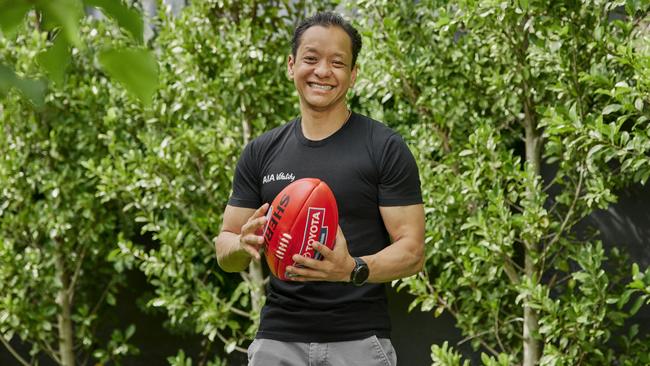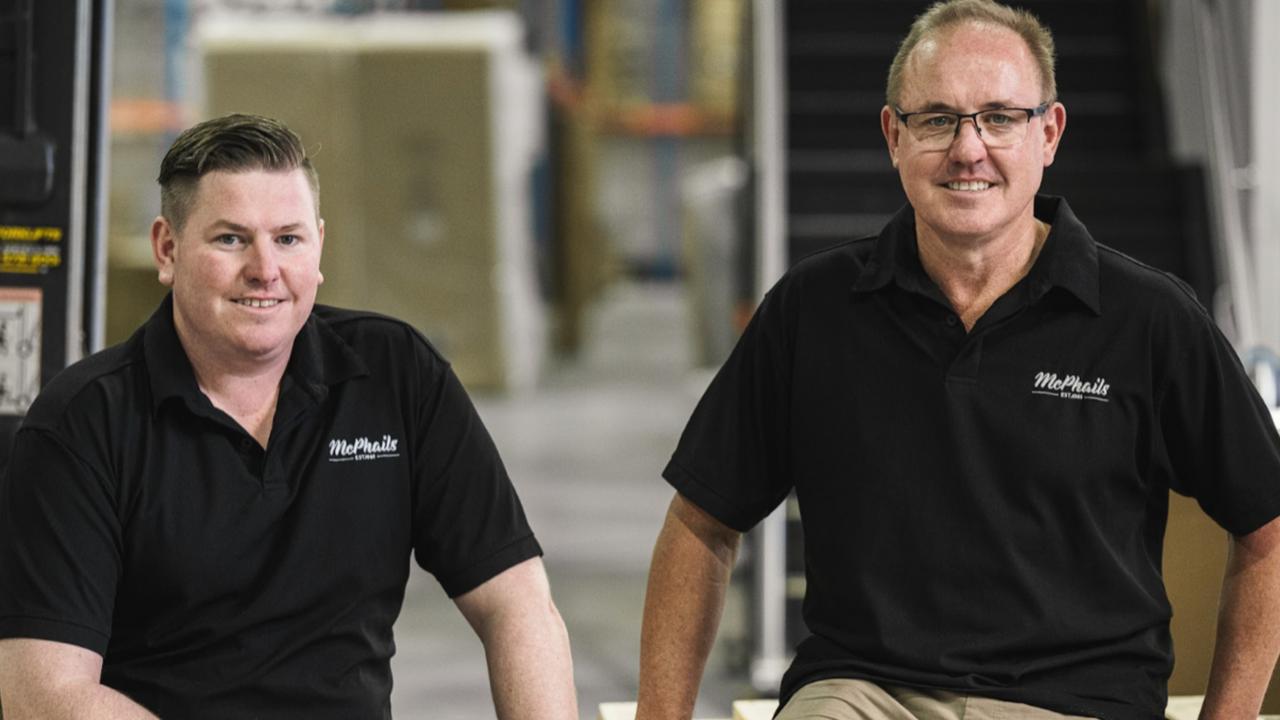‘The racism is still there’: Why driving diversity is personal for AIA Australia CEO Damien Mu
After painful schoolyard lunchtimes, driving diversity is personal for AIA Australia chief Damien Mu.

Friday afternoons during his primary school years carry painful memories for Damien Mu.
Without fail he would be scolded by his mother when she opened his school bag and found a week’s worth of sandwiches buried at the bottom.
“I was always too embarrassed to eat my sandwiches at school because the other kids would make fun of what was on them. This is not a sorry story, but kids don’t realise the impact they have. It stopped me eating,” he says.
“I never told my mother. I was very sensitive and I didn’t want to upset her. Maybe I was a bit ashamed, I don’t know. Even years later as an adult, people used to say to me ‘Why don’t you eat lunch?’”
Born in Melbourne to a Sri Lankan mother and half-Burmese, half-Chinese father, Mu never thought he was different to others until an incident in the school playground when he was nine years old.
“I was in the schoolyard with a group when they were making fun of someone. I had this moment where I thought ‘Hang on, this person looks like me.’ It was an awakening moment. I realised that the world can be a bit mean sometimes and not everyone is the same,” he says.
Navigating this experience – and not letting it define him – taught Mu resilience and empathy. It also forced him from a young age to work hard to integrate and endear himself to be accepted and successful.
“I never used it as an excuse. I used it as a way to realise I had to value diversity and differences. I was proud of the fact I didn’t see differences with other kids from an early age until I had that schoolyard experience. I also had to work harder and be stronger to be able to come back from those things and not let them effect me,” he says.
Today Mu is the chief executive and managing director of AIA Australia, the local arm of the Hong Kong-based AIA Group, which is the largest listed company on the Hong Kong stock exchange and the largest life and health insurer in Asia, covering 19 countries.
The largest acquisition in AIA’s 100-year history was the $3.8bn purchase of CBA’s Australian and New Zealand life insurance businesses, CommInsure, in September 2017.
Mu began his career in the Melbourne mailroom of Colonial more than 20 years ago and started at AIA Australia in 2007, before being appointed to the role of CEO in 2014. AIA Australia is chaired by former Packer family company executive Peter Yates.
Mu, now a married father of two, says he is passionate about inspiring people to be their best and in leading a purpose-led organisation that makes a difference and champions healthier, longer, better lives.
But his first encounter of racism in the schoolyard was far from his last. Since then he has faced it in both business and sport.
“For some people, they love the fact there is someone who looks different and comes from a different background who has been able to be successful in Australian financial services. It’s great to think I have been able to inspire people,” he says.
During the years he played school football he recalls being called “Dim Sim” by parents on the sidelines. Now at the age of 47, he still plays Australian football in one of Melbourne’s Super Rules competitions.
“But on the other side, the racism is still there. Even when I play sport now, it is still there. In sport people can’t control their emotions in that moment,” he says.
More recently, Mu was reminded of his first schoolyard encounter with discrimination when his daughter experienced racism for the first time in kindergarten.
“I get angry when it is about my children, which is natural. But otherwise I just feel sad and sorry for people, not angry. I am an eternal optimist and I believe in embracing difference to make a difference. If I see it, I have no problem calling it out. I am always a believer that the behaviour you walk past sets the standard. So I am clear on the boundaries to call it out,” he says.
“I think Australia is a phenomenal place and society. But it still has a way to go on diversity. We have to continue to raise the awareness of these issues. But we are very blessed to have a multicultural society.”
Mu learned all about selfless leadership and the importance of having a purpose from his Sri Lankan grandmother Iona.
She left an affluent life in Sri Lanka to move to Australia in a bid to give her family a better life and worked tirelessly in a factory in Dandenong to support them. When they migrated, the family all lived together in the same suburban home.
“She was my hero, I just didn’t realise it until later in life. I learned so many lessons from her around the power of purpose and people having a common goal. What I loved about what my grandmother did was that she was a woman of actions, not words. She showed real leadership through actions,” Mu says.
His father left his mother when he was only two and returned to Sri Lanka. Mu quickly developed a strong bond with his stepfather, who worked during the day and studied at night.
“My stepfather came along at a really early age. He was another that really embodied that work ethic,” he says.
“I didn’t see my father very often growing up but I am very grateful I still had a relationship with him. He has been an influence in my life as well. I have no remorse or regrets, it is just the way life worked.”
When Mu was 10, his mother gave birth to a daughter. Six years later she had twin boys.
For decades his grandmother remained the force that united the family. Every Sunday she would cook up a storm for her children and grandchildren at her unit in Clayton.
But Mu’s life changed forever in January 2014 when a heatwave hit Melbourne. The city recorded four consecutive days of temperatures over 41 degrees and his grandmother was overcome with heat stroke.
“She was so proud, she never really wanted any help. We were telling her during that time to come and stay with us in the airconditioning. But she wanted to stay in her unit,” he recalls.
She subsequently suffered a stroke, from which she never recovered, and passed away in May 2015.
“She was so strong and resolved and never asked for or complained about anything. During one incident at the factory she cut part of her finger off. She had operations. But she never complained,” he says.
“After all the different things that she went through, it was bizarre to think that was what got her in the end. I’ve never got over it, to be honest.”
Mu’s long-held passion for the Hawthorn football club draws from his grandmother on his stepfather’s side of the family, who also migrated to Australia to live in Hawthorn and became a vocal follower of the team long chaired by former Victorian premier Jeff Kennett.
She would regularly pen angry letters to Kennett when a star player such as former Hawks captain Shane Crawford was dropped from the team.
Mu long dreamed of being an AFL footballer. At one point he trained with Melbourne’s Robert Flower squad – named after the former club champion – and was invited to train with the Sandringham Zebras VFL team (he still has the invitation letter), but never made it to the big time.
He will always regret not working harder at his football.
“I used excuses that I had to go to university and get a job, etc. But I was taking the easy way out. I was actually fearful of getting the cut and not making it. I was able to use that as a catalyst for good later in life,” he says, adding that he learned a valuable life lesson from the experience.
“It is about giving your best. As long as you have given your best, you can’t lose. The feeling of losing is when you haven’t given your best and you regret that you didn’t give more.”
When Mu was named the ANZ Institute of Insurance & Finance’s Insurance Leader of the Year in 2021, the judges praised his work in the area of mental health, especially during the Covid-19 pandemic.
His passion for the cause has driven AIA Australia’s radical re-pitch of life insurance as part of a much broader and affordable relationship around health and wellbeing.
Its flagship product is AIA Vitality, which began in South Africa as a scientific wellness program that offers to educate and improve customer health by providing rewards for better lifestyles.
They include lower premiums, flights and discounted gym memberships.
Most importantly, its services are data driven.
“We all have a common goal, we all want to be healthy and productive. How do we pool our efforts together? What was missing before AIA Vitality was data and a substantiation for what people would have intuitively thought,” Mu says.
“The issue of mental well being is like physical well being. You need to take care of both.”
AIA is now the health and wellness sponsor for a number of AFL clubs including Collingwood, St Kilda, North Melbourne and Essendon.
Mu believes the life and health insurance sector is still regaining its feet after the necessary changes forced by the Hayne royal commission.
The life insurance market in Australia is now half the size it once was. For the first time Mu says AIA is seeing underinsurance and advice gaps in the local market, after enjoying years of strong growth.
“To me, there are too many Australian families that are not covered and they don’t have partners who will help them on their health journey upfront. We have been good responding to things that happen. Now we need to put some real investment into prevention. Otherwise we won’t have enough supply to meet the demand for health services that will be required,” he says.
“My dream from a business perspective is to build a health and wellbeing ecosystem around predict, prevent, diagnose, treat and recover.”
Mu often visited Sri Lanka when he was growing up. His dream now is to take his children there.
“They have been locked down for three years. I would love to take them to see where their grandparents came from and to have the chance to appreciate their family history,” he says.
He is proud his resilience in responding to experiences of racism throughout his life has shaped his passion for inclusion and diversity in leadership.
He now wants more leaders to be prepared to lead from the front and be vocal on social issues to forge a better society.
“I believe leadership is about bringing the head and the heart. Leaders today need to be able to win the hearts and minds. Leadership is a privilege and a responsibility,” he says.
“When there are issues to be talked about that effect our society, people are looking for leadership. You as a leader need to have a view.”




To join the conversation, please log in. Don't have an account? Register
Join the conversation, you are commenting as Logout